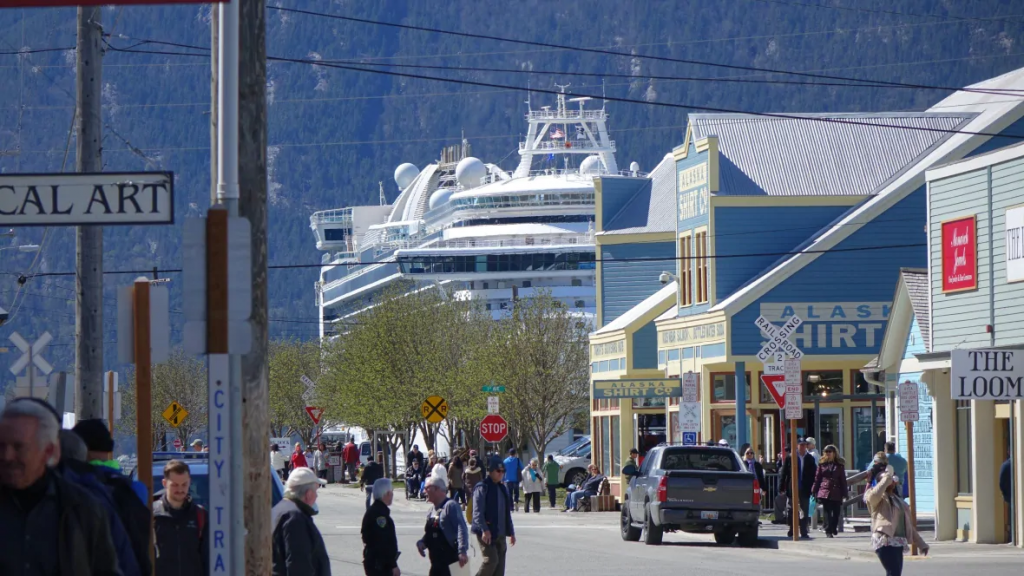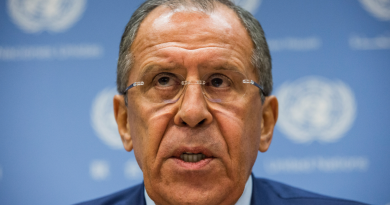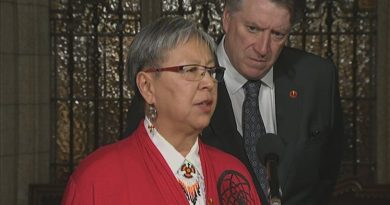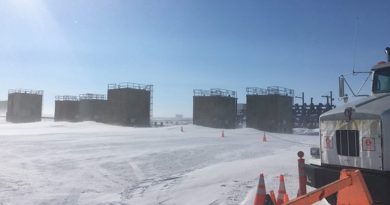Mayor of Skagway, Alaska, hopes vaccinations will allow Canada-U.S. travel

Mayor Andrew Cremata says economic activity is sorely needed as community depends on tourism
The mayor of Skagway, Alaska, is among those wondering if more vaccinations against COVID-19 will lead to some allowance of travel across the Canada-U.S. border.
Andrew Cremata says any easing of border restrictions would surely help Skagway’s struggling local economy. Recent cancellations by cruise lines have only added to a lack of visitors in a community where tourism is the main economic engine.
“I am hoping that when we get the vaccines done that there’s some concessions made,” Cremata said.
Cremata says he’d feel comfortable if people who show proof of vaccination at the Canada-U.S. border were allowed to visit.
“It’d be really nice to have that border open, so you can come down here and support us and we can get back up to Whitehorse,” Cremata said.
“I am hopeful that will happen, but it’s way out of our control,” he said.
‘Leisure visitors are definitely not allowed’ says Yukon MP
Yukon MP Larry Bagnell replied to an email from CBC on the question of border policy, and whether people who have received the vaccine could be allowed to travel.
Bagnell wrote that border rules have just been made more strict in Canada. He does not suggest any move pending in the opposite direction.
“Four days ago Canada tightened restrictions on the USA and other international borders, requiring everyone, including Canadians, not only to continue to quarantine for 14 days upon arrival, but also to have proof of a negative COVID test, within 72 hours prior to boarding a plane for Canada,” Bagnell wrote on Jan.12.
“The situation remains the same for foreigners, that for the most part, only essential workers can enter Canada, and, since the beginning of the pandemic, leisure visitors are definitely not allowed.”
Bagnell says it’s not clear what will change at the borders when more people get the vaccine.
“Research is continuing on the degree of effectiveness that having received a vaccination has, on reducing the ability to spread COVID-19,” he wrote.
The Canada-U.S. border has been closed since March. However Yukon has allowed Alaskans to transit through on the road system under conditions and including a specified route and a maximum time.
The Canada-U.S. agreement bars entry to most travellers who are not Canadian citizens, permanent residents or people entering from the U.S. for “essential” reasons.
It took effect in late March.
On Tuesday, federal Public Safety Minister Bill Blair announced that the Canada-U.S. border will remain closed to non-essential travel until at least Feb. 21, to prevent the spread of COVID-19.
‘Lots of conversations’ to have, says minister
The Yukon government so far has not clearly laid how how territorial border policies will change as more people get inoculated against COVID-19.
A 14-day mandatory quarantine upon entry into Yukon is still required.
Skagway itself has enacted a 7-day mandatory quarantine for people entering the community.
Yukon Minister of Tourism and Culture Jeanie McLean was asked about the idea of “vaccination passports” last month during a discussion of Yukon’s tourism revival strategy.
She replied that the territorial government would be “having a lot of conversations” on the matter.
McLean said these discussions would be happening with the chief medical officer of health, and would be seeking “recommendations to keep Yukoners safe.”
Chief Medical Officer Dr. Brendan Hanley was also asked in December whether people inoculated in Yukon would have some kind of document to show.
“It’s a question we’re considering at a national level. There will likely be some kind of documentation, but we’re working out what the role of that will be. Because of course there are opportunities for misuse of the documentation,” he said.
Skagway in ‘uncharted territory’ economically, says mayor
The question of tourism is fundamental to Skagway. In 2019 the community was projecting it would soon welcome a million visitors a year, with most coming in on cruise ships.
Skagway is also a stop for the White Pass & Yukon Route, a historic tourist train route which had recently seen refurbishment and new investment before the pandemic.
Cremata says the question of economic stimulus has become more pressing now as money distributed through the U.S Congress’ Coronavirus Aid, Relief, and Economic Security (CARES) Act has run out.
“What we did previously was that we used federal CARES Act money and distributed $1,000 cheques from July through December to every resident of Skagway regardless of age. That was the money that was going into the economy. But the CARES Act money ran out at the end of December. So currently we’re in uncharted territory,” he said.
“With the last stimulus package that Congress put together there’s nothing in there that’s similar to the CARES package. No money designated for municipalities,” he said.
Related stories from around the North:
Canada: Chamber of Commerce in Canada’s Northwest Territories says tourism threatened by COVID-19 border restrictions, CBC News
Denmark: Who is allowed into Denmark from Sweden right now?, Radio Sweden
Finland: How not to promote Arctic tourism, Eye on the Arctic
Greenland: Greenland changes COVID-19 rules for travellers from Iceland, Faroe Islands, Eye on the Arctic
Norway: Norwegian Arctic wilderness tourism hit particularly hard by coronavirus, The Independent Barents Observer
Russia: All Russia’s North Pole cruises rescheduled to 2021, Eye on the Arctic
Sweden: Summer tourism recovery is slow going in Sweden, Yle News
United States: Airline shutdown creates new challenges for rural Alaska, The Associated Press



